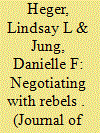|
|
|
Sort Order |
|
|
|
Items / Page
|
|
|
|
|
|
|
| Srl | Item |
| 1 |
ID:
154925


|
|
|
|
|
| Summary/Abstract |
Too often, our analyses of nonstate violent groups tend to black box the other aspects of what such groups do. Some groups choose to provide governance (in the form of goods of services) in addition to coordinating violence to achieve political goals. These different kinds of functions, whether violent or not, are all tied to the same underlying organizational structure. From this basic insight, we argue that groups that pursue both governance and violence will tend to have the following organizational structure: clear organizational agenda setting, command and control, and accountability mechanisms. This organizational structure will tend to produce a unique violence profile and allow for the provision of governance. In short, we point out the double-edged sword of organizational structure in terms of the outcomes that groups produce. Using several datasets, including the new Terrorist and Insurgent Organization Social Services dataset that accounts for the provision of social services, we show a preliminary association between violence and governance that demands future exploration. Thus, as a theory-building effort, our work demonstrates the importance of accounting for the diversity of activities that violent groups might pursue and offers evidence for how organizational structure shapes the possibility of pursuing different activities.
|
|
|
|
|
|
|
|
|
|
|
|
|
|
|
|
| 2 |
ID:
153658


|
|
|
|
|
| Summary/Abstract |
When rebels provide social services, do they have more leverage negotiating the terms of a peace deal? The literature suggests service-providing groups may, on average, have a wider base of support and a more centralized organizational structure. We argue that these features deter potential spoilers from breaking away from the organization during negotiation processes. This, in turn, makes governments more willing to enter negotiations since the threat from spoilers is smaller. Thus, compared to nonproviders, service-providing rebels are more likely to engage in negotiations and these processes are likely to be more stable. This article analyzes these propositions by gathering service provision data on nearly 400 rebel groups and their involvement in and behavior during peace talks. It also serves as an introduction to a larger project about the implications of rebel service provision on conflict outcomes.
|
|
|
|
|
|
|
|
|
|
|
|
|
|
|
|
| 3 |
ID:
137025


|
|
|
|
|
| Summary/Abstract |
Many of the world’s most infamous terrorist organizations demonstrate clear political aptitude, maintaining highly successful political parties while simultaneously carrying out terrorist attacks. Yet the relationship between terrorism and a group’s political fortune is unclear. Groups like Hamas and Hezbollah appear to have gained significant support as a consequence of certain attacks, most notably those against US and Israeli targets. Other organizations fight for their political life after certain attacks. The Provisional Irish Republican Army (IRA) and its political wing, Sinn Fein, scrambled to restore its public image after bombs in Enniskillen, Northern Ireland, killed 11 Protestant civilians. In this article I examine the relationship between violence and political participation. I show that rebel groups are less likely to attack civilians when they simultaneously participate in democratic elections. I argue that attacking civilians is not good for political business. Not only can it distinguish the group as a terrorist organization and alienate supporters as a result, but attacking civilians also imposes high costs on the group’s own civilian support base. For these reasons, civilians frequently withdraw political support for rebel groups after they target civilians, which can be profoundly harmful to rebels. I analyze the violent and political behavior of non-state violent organizations from the Middle East and North Africa from 1980 to 2004. I also examine the IRA as a means of describing the causal mechanism advanced here.
|
|
|
|
|
|
|
|
|
|
|
|
|
|
|
|
|
|
|
|
|